Cooperative Agreement
Cooperative Agreement
This cooperative agreement ("Agreement") is made and entered into on [Date] by and between [Organization A] ("Cooperator") and [Organization B] ("Collaborator").
Purpose
The purpose of this Agreement is to establish a cooperative relationship between Cooperator and Collaborator for the purpose of [Insert purpose of the collaboration].
Scope of Work
Cooperator and Collaborator agree to work together to achieve the following objectives:
[Insert objective 1]
[Insert objective 2]
[Insert objective 3]
Cooperator and Collaborator shall provide the following resources to achieve these objectives:
[Insert resources provided by Cooperator]
[Insert resources provided by Collaborator]
Each party shall be responsible for its own costs and expenses incurred in the performance of its obligations under this Agreement.
Term and Termination
This Agreement shall commence on the date first written above and shall continue until [Insert end date] unless earlier terminated by either party upon thirty (30) days’ written notice to the other party.
Intellectual Property
Cooperator and Collaborator acknowledge that any intellectual property created or developed in connection with the performance of this Agreement shall be owned by the party that created or developed it, subject to any applicable rights of the other party.
Confidentiality
Cooperator and Collaborator agree to keep confidential all information disclosed by one party to the other party that is designated as confidential or that, under the circumstances, ought to be treated as confidential.
Indemnification
Each party agrees to indemnify and hold harmless the other party and its officers, directors, agents, and employees from and against any claims, damages, liabilities, costs, and expenses arising out of or in connection with the performance of this Agreement.
Governing Law
This Agreement shall be governed by and construed in accordance with the laws of the [State/Country] without giving effect to its conflict of laws principles.
Entire Agreement
This Agreement constitutes the entire agreement between the parties and supersedes all prior negotiations, understandings, and agreements between the parties with respect to the subject matter of this Agreement.
Amendments
This Agreement may be amended only in writing signed by both parties.
IN WITNESS WHEREOF, the parties have executed this Agreement as of the date first written above.
[Organization A]
By: ___________________________
Name: _________________________
Title: __________________________
[Organization B]
By: ___________________________
Name: _________________________
Title: __________________________
What is a Cooperative Agreement Letter and Why is it Important?
A Cooperative Agreement letter is a formal document that establishes, modifies, or acknowledges a collaborative relationship between two or more parties working toward shared goals. Unlike binding contracts, these letters outline mutual understanding, resource sharing, responsibilities, and expectations in partnerships ranging from business ventures to community projects, educational collaborations, or inter-organizational initiatives. The purpose is to create transparency, prevent misunderstandings, and provide a reference point for all parties involved in the cooperative effort.
Who Should Write and Send Cooperative Agreement Letters?
- Project managers initiating multi-stakeholder collaborations
- Business owners establishing partnerships or joint ventures
- Educational institutions forming collaborative programs
- Non-profit organizations creating alliances
- Government agencies coordinating inter-departmental projects
- Community leaders organizing neighborhood initiatives
- Department heads within organizations coordinating cross-functional work
- Legal representatives formalizing cooperative arrangements
- Board members approving collaborative ventures
- Grant recipients working with co-implementing partners
To Whom Should Cooperative Agreement Letters Be Addressed?
- Potential partner organizations and their authorized representatives
- Co-signatories in multi-party agreements
- Board members or trustees requiring approval
- Funding agencies overseeing collaborative grants
- Legal counsel reviewing partnership terms
- Stakeholders affected by the cooperative arrangement
- Team members who will execute the agreement
- Regulatory bodies requiring notification of partnerships
- Insurance providers covering joint activities
- Community members impacted by the collaboration
Formal Cooperative Agreement Proposal
Subject: Proposal for Cooperative Agreement Between [Your Organization] and [Partner Organization]
Dear [Recipient Name],
I am writing on behalf of [Your Organization] to propose a formal cooperative agreement between our organizations. After careful consideration of our shared objectives and complementary strengths, we believe a structured collaboration would significantly benefit both parties and the communities we serve.
The proposed cooperative agreement would focus on [specific area of collaboration], with each organization contributing [specific resources, expertise, or capabilities]. We envision this partnership lasting [timeframe] with clearly defined roles, responsibilities, and success metrics.
Our organization brings to this collaboration [list specific assets, expertise, resources], while your organization's [mention partner's strengths] would complement our efforts perfectly. Together, we could achieve [specific outcomes] that neither organization could accomplish independently.
We propose the following key elements for this agreement: shared governance structure, resource allocation guidelines, intellectual property rights framework, communication protocols, dispute resolution procedures, and performance evaluation criteria. Financial responsibilities would be distributed proportionally based on [specific formula or arrangement].
I have attached a detailed proposal outlining the scope, timeline, budget, and expected deliverables. We would welcome the opportunity to discuss this proposal at your earliest convenience and address any questions or concerns you may have.
Please let me know your availability for a meeting within the next two weeks to explore this opportunity further.
Sincerely,
[Your Name]
[Your Title]
[Contact Information]
Cooperative Agreement Amendment Request
Subject: Request to Amend Existing Cooperative Agreement [Agreement Number/Name]
Dear [Partner Name],
I hope this message finds you well. I am writing regarding our current cooperative agreement dated [original date], which has been successfully guiding our collaboration on [project name].
Due to [specific circumstances: changed market conditions, new opportunities, resource constraints, regulatory changes, expanded scope], we respectfully request an amendment to the following sections of our agreement: [list specific sections or clauses requiring modification].
The proposed changes include [detailed description of requested amendments]. These modifications would allow us to [explain benefits: better serve our mutual objectives, respond to emerging challenges, optimize resource allocation, extend our impact].
We have carefully reviewed the original agreement and believe these amendments align with our shared vision while addressing current realities. The changes would not alter the fundamental purpose of our partnership but would provide necessary flexibility to [specific outcomes].
Our legal team has drafted the proposed amendment language, which I have attached for your review. We are committed to maintaining the collaborative spirit that has made our partnership successful and are open to discussing any concerns or alternative approaches you may have.
Could we schedule a call within the next week to discuss these proposed amendments? We value this partnership greatly and want to ensure any changes strengthen rather than complicate our collaboration.
Thank you for your consideration and continued partnership.
Best regards,
[Your Name]
[Your Title]
[Contact Information]
Cooperative Agreement Acceptance Letter
Subject: Acceptance of Cooperative Agreement Proposal
Dear [Proposing Party Name],
On behalf of [Your Organization], I am pleased to formally accept the cooperative agreement proposal you submitted on [date]. After thorough review by our leadership team and legal counsel, we are enthusiastic about moving forward with this partnership.
Your proposal aligns perfectly with our strategic objectives, particularly in [specific areas]. We are confident that combining your organization's expertise in [specific strengths] with our capabilities in [your strengths] will create significant value for all stakeholders involved.
We accept the terms as outlined in the proposal, including the governance structure, resource commitments, timeline, and deliverables. Our organization commits to providing [specific resources, staff, funding] as specified in the agreement framework.
To proceed, we suggest the following next steps: finalize the formal agreement document by [date], schedule a kickoff meeting for [date range], establish the joint steering committee by [date], and begin preliminary work on [initial activities].
Our designated representative for this cooperative agreement will be [Name, Title], who will serve as the primary point of contact for coordination and communication. Please share the contact information for your designated representative as well.
We look forward to a productive and mutually beneficial partnership. Please send the final agreement documents for signature at your earliest convenience.
Warmest regards,
[Your Name]
[Your Title]
[Organization Name]
[Contact Information]
Cooperative Agreement Progress Update
Subject: Quarterly Progress Report on [Agreement Name] Cooperative Partnership
Dear Partners,
I hope everyone is doing well. As we reach the end of [quarter/period], I wanted to share a comprehensive update on our cooperative agreement activities and achievements.
During this period, we have successfully completed [list major milestones or deliverables]. Our joint team has made significant progress on [specific initiatives], with [quantifiable results or outcomes]. The collaboration between our organizations has proven even more productive than initially anticipated.
Key accomplishments include: [bullet points of achievements]. Financially, we are [on track/ahead/slightly behind] budget, having spent [amount] of the allocated [total budget]. Resource utilization has been efficient, with both organizations contributing as planned.
However, I want to bring to your attention some challenges we've encountered: [describe any obstacles, delays, or concerns]. We propose the following solutions: [suggested approaches to address challenges]. These adjustments would require [minor modifications/no changes/approval from steering committee].
Looking ahead to the next quarter, our priorities include [list upcoming focus areas]. We anticipate completing [specific deliverables] by [dates]. To stay on schedule, we will need [any additional resources or support required].
The partnership has generated positive feedback from [stakeholders, beneficiaries, community members], particularly regarding [specific impacts]. This validates our approach and encourages us to explore potential expansion of our collaborative efforts.
Our next steering committee meeting is scheduled for [date]. Please review the attached detailed report and come prepared to discuss [specific agenda items]. If you have any questions or concerns before the meeting, please don't hesitate to reach out.
Thank you for your continued commitment to this partnership.
Best regards,
[Your Name]
[Title]
[Contact Information]
Cooperative Agreement Termination Notice
Subject: Notice of Cooperative Agreement Termination
Dear [Partner Name],
After careful deliberation, I must inform you that [Your Organization] has decided to terminate our cooperative agreement dated [agreement date], effective [termination date]. This decision complies with the termination clause outlined in Section [X] of our agreement, which requires [notice period] advance notice.
This decision was not made lightly. The reasons for termination include [provide clear, factual reasons: strategic realignment, resource constraints, changed organizational priorities, inability to meet obligations, unresolved disputes]. Despite our best efforts to [mention attempts to resolve issues], we have concluded that continuing the partnership is not feasible.
We remain committed to an orderly and professional transition. Our proposed wind-down plan includes: completing current obligations by [date], transferring shared resources or materials by [date], finalizing financial settlements by [date], and providing necessary documentation for continuity.
All parties will retain rights to work products created independently before the partnership. Jointly developed materials will be handled according to Section [X] of our agreement. We will ensure all confidential information continues to be protected as stipulated in our confidentiality provisions.
Outstanding financial matters total [amount], which we propose to settle by [date and method]. Any shared equipment or resources will be [returned/divided/disposed of] according to the agreement terms.
We appreciate the efforts your organization has contributed during our collaboration and regret that circumstances have led to this outcome. We hope this termination can be conducted amicably and professionally, preserving the possibility of future cooperation under different circumstances.
Please contact me directly to discuss the transition process and address any questions or concerns. We are committed to minimizing disruption and honoring all obligations through the termination date.
Sincerely,
[Your Name]
[Your Title]
[Organization Name]
[Contact Information]
Cooperative Agreement Renewal Proposal
Subject: Proposal to Renew and Enhance Our Cooperative Agreement
Dear [Partner Name],
As our current cooperative agreement approaches its expiration date of [date], I am writing to propose renewal and enhancement of our successful partnership. The past [timeframe] has demonstrated the tremendous value of our collaboration, and we believe continuing this relationship would benefit both organizations.
Our partnership has achieved remarkable results, including [list major accomplishments, quantifiable outcomes, success stories]. These achievements exceeded our initial projections and have created lasting impact for [beneficiaries/stakeholders]. Feedback from all participants has been overwhelmingly positive.
For the renewal period, we propose maintaining the core framework that has worked well while introducing several enhancements: [list proposed improvements, expanded scope, additional resources, new initiatives]. These modifications would address lessons learned and capitalize on opportunities we've identified during our collaboration.
The proposed renewal term would be [duration], with an option to extend for an additional [period] based on mutual agreement. We suggest adjusting the resource commitments as follows: [detail any changes in funding, staffing, or other contributions]. These adjustments reflect current organizational capacities and the evolved scope of our partnership.
We have drafted an updated agreement document that incorporates these changes while preserving the successful elements of our current arrangement. The new agreement would take effect on [date], ensuring seamless continuation of our joint activities.
I would appreciate the opportunity to discuss this renewal proposal with you and your team. Could we schedule a meeting in the next two weeks to review the terms and address any questions? We are flexible and open to negotiating any aspects of the proposal to ensure it meets both organizations' needs.
Thank you for the excellent partnership over the past [timeframe]. We look forward to continuing and strengthening our collaboration.
Warm regards,
[Your Name]
[Your Title]
[Contact Information]
Casual Cooperative Agreement Check-In
Subject: Quick Check-In on Our Partnership
Hi [Partner Name],
Hope you're having a great week! I wanted to touch base informally about how our cooperative agreement is going from your perspective.
Things are running pretty smoothly on our end. The team has been really energized by the collaboration, and we're seeing some fantastic results with [specific project or activity]. I've heard nothing but positive things from the folks working directly on our joint initiatives.
That said, I always think it's valuable to check in beyond the formal reporting structure. How are things looking from your side? Is there anything you wish was working differently or any concerns I should know about? I'd rather catch small issues early than let them become bigger problems down the road.
Also, I've been thinking about [mention an idea, opportunity, or potential enhancement]. It might be outside our current scope, but it seems like a natural extension of what we're doing. Would love to hear your thoughts if you have time.
No rush on responding—whenever you have a few minutes works for me. Or if you prefer, we could grab coffee or jump on a quick call to chat things through.
Thanks for being such a great partner on this. It's genuinely been one of the most productive collaborations I've been involved in.
Cheers,
[Your Name]
Cooperative Agreement Dispute Resolution Request
Subject: Request for Dispute Resolution Under Cooperative Agreement
Dear [Partner Name],
I am writing to formally invoke the dispute resolution procedures outlined in Section [X] of our cooperative agreement dated [date]. Despite good-faith efforts to resolve this matter informally, we have been unable to reach a mutually acceptable solution regarding [specific issue or disagreement].
The dispute concerns [detailed description of the issue, including relevant facts, dates, and circumstances]. Our interpretation of the agreement is that [your position], based on [specific clauses or provisions]. However, it appears your organization holds a different view, creating an impasse that affects [describe impact on the partnership or project].
We have attempted to resolve this through [list previous resolution attempts: direct discussions, emails, meetings] without success. The continued disagreement is creating [describe negative consequences: delays, increased costs, damaged relationships, compromised outcomes].
According to our agreement's dispute resolution clause, the next step is [mediation/arbitration/steering committee review/other specified process]. We formally request that this process be initiated within [timeframe specified in agreement]. We propose [name] as our designated representative for these proceedings.
We remain committed to finding a fair resolution that preserves our partnership while addressing the legitimate concerns of both parties. Our preferred outcome would be [describe ideal resolution], but we are open to alternative solutions that satisfy the spirit of our cooperative agreement.
Please confirm receipt of this request and your agreement to proceed with the dispute resolution process. We should schedule the initial session for no later than [date]. In the meantime, we will continue to fulfill all other obligations under the agreement.
We hope this formal process will provide a structured path to resolution and allow us to move forward constructively.
Respectfully,
[Your Name]
[Your Title]
[Organization Name]
[Contact Information]
When Should Cooperative Agreement Letters Be Written and Sent?
- When initiating a new partnership or collaboration between organizations
- Before launching joint projects that require formalized roles and responsibilities
- When existing informal collaborations need to be documented and structured
- After preliminary discussions conclude successfully and parties are ready to commit
- When amendments to existing agreements become necessary due to changed circumstances
- At regular intervals for renewal consideration (typically 30-90 days before expiration)
- When disputes arise that cannot be resolved through informal communication
- Following significant milestones or phase completions requiring documentation
- When terminating partnerships according to contractual notice requirements
- After organizational restructuring affects partnership arrangements
- When funding agencies require documented collaboration as grant conditions
- Upon changes in leadership that necessitate reaffirmation of commitments
Elements and Structure of Cooperative Agreement Letters
- Clear subject line identifying the letter's purpose and agreement reference
- Formal greeting addressing appropriate decision-makers
- Context and background explaining the partnership's history or rationale
- Specific purpose statement clarifying the letter's intent
- Detailed scope definition outlining collaboration boundaries and focus areas
- Roles and responsibilities specifying what each party will contribute
- Timeline and milestones establishing key dates and deliverables
- Resource commitments documenting financial, personnel, and material contributions
- Governance structure explaining decision-making processes and authority
- Communication protocols defining reporting requirements and contact points
- Performance metrics identifying how success will be measured
- Dispute resolution procedures providing frameworks for addressing conflicts
- Modification and termination clauses explaining how agreements can be changed or ended
- Next steps and calls to action specifying required responses or activities
- Attachments and supporting documents including detailed proposals, budgets, or legal drafts
- Professional closing with signature blocks and contact information
How to Write and Send Effective Cooperative Agreement Letters
- Begin with research understanding your partner's priorities, constraints, and organizational culture
- Clarify internal approval ensuring your organization's leadership supports the proposed collaboration
- Draft comprehensively covering all essential elements while maintaining readability
- Use precise language avoiding ambiguity in commitments, timelines, and responsibilities
- Balance formality with warmth maintaining professionalism while building relationship
- Include specific details providing concrete information rather than vague generalities
- Anticipate questions addressing likely concerns proactively within the letter
- Seek legal review having counsel examine binding elements and liability issues
- Obtain necessary approvals securing signatures from authorized representatives
- Choose appropriate delivery method using certified mail for formal agreements, email for routine communications
- Maintain documentation keeping copies of all correspondence and related materials
- Follow up appropriately confirming receipt and scheduling necessary discussions
- Track deadlines monitoring response timeframes and action items
Formatting Guidelines for Cooperative Agreement Letters
- Length: 1-3 pages for most correspondence; detailed proposals may extend to 5-10 pages with attachments
- Tone: Professional and collaborative, balancing formality with accessibility
- Structure: Use clear paragraphs, bullet points for lists, and logical section divisions
- Language: Direct and specific, avoiding jargon unless industry-standard
- Fonts: Traditional business fonts (Times New Roman, Arial) in 11-12 point size
- Spacing: Single-spaced with double spacing between paragraphs
- Margins: Standard one-inch margins on all sides
- Headers: Include organization letterhead for formal communications
- Reference numbers: Assign tracking numbers to agreements for easy identification
- Signatures: Provide signature blocks for all parties when binding commitment is involved
- Distribution: Clearly indicate all recipients and copied parties
- Attachments: Reference and list all accompanying documents
- Digital formatting: Use PDF format for official documents to preserve formatting
Requirements and Prerequisites Before Writing Cooperative Agreement Letters
- Conduct preliminary discussions establishing mutual interest and compatibility
- Obtain internal authorization from leadership or boards to enter negotiations
- Complete due diligence on potential partners' reputation, capacity, and financial stability
- Clarify organizational objectives and what you hope to achieve through collaboration
- Assess available resources that can be committed to the partnership
- Review existing policies, contracts, and obligations that may affect the agreement
- Identify legal or regulatory requirements governing cooperative arrangements in your field
- Determine who has signing authority for binding agreements
- Prepare budget estimates for partnership activities and resource contributions
- Consult with legal counsel about liability, intellectual property, and contractual issues
- Gather supporting documentation such as organizational profiles, financial statements, or capability statements
- Define success metrics and evaluation frameworks before formalizing agreements
- Ensure alignment with strategic plans and organizational missions
After Sending: Follow-Up Actions for Cooperative Agreement Letters
- Confirm receipt within 24-48 hours for time-sensitive correspondence
- Schedule follow-up meetings to discuss terms, answer questions, or negotiate details
- Track responses noting when replies are received and any action items generated
- Maintain communication log documenting all correspondence related to the agreement
- Address questions promptly responding to inquiries with clarity and completeness
- Provide additional information supplying requested documentation or clarifications
- Negotiate modifications remaining flexible while protecting core interests
- Finalize documentation preparing official agreement documents after acceptance
- Implement governance structures establishing committees, working groups, or coordination mechanisms
- Begin operational planning developing detailed work plans and timelines
- Communicate with stakeholders informing affected parties about the partnership
- Monitor compliance ensuring all parties fulfill their commitments as agreed
- Conduct regular reviews assessing partnership performance against objectives
- Document lessons learned capturing insights for future collaborative efforts
Advantages and Disadvantages of Cooperative Agreement Letters
Advantages:
- Provides clarity and prevents misunderstandings between partners
- Documents commitments and creates accountability for all parties
- Establishes framework for resolving disputes before conflicts escalate
- Protects interests of all organizations involved in the collaboration
- Facilitates resource sharing and leverages complementary strengths
- Creates formal record for stakeholders, funders, and regulatory bodies
- Enables more ambitious projects than single organizations could undertake
- Builds institutional relationships that may yield future opportunities
- Distributes risks and responsibilities across multiple parties
Disadvantages:
- Requires significant time and effort to negotiate and finalize
- May create rigidity that limits flexibility to adapt to changing circumstances
- Can generate administrative burden through reporting and coordination requirements
- Involves potential for disputes and conflicts between partners
- May dilute organizational identity or autonomy in joint activities
- Requires sharing sensitive information and resources with external parties
- Creates dependencies that may be problematic if partners underperform
- Involves legal and administrative costs for drafting and managing agreements
Common Mistakes to Avoid When Writing Cooperative Agreement Letters
- Using vague language that allows multiple interpretations of commitments
- Failing to specify timelines, leaving schedules ambiguous
- Omitting governance structures and decision-making processes
- Neglecting to address intellectual property rights and ownership
- Underestimating resource requirements and overcommitting capabilities
- Ignoring potential conflicts of interest or competitive concerns
- Forgetting to include termination and modification procedures
- Making verbal agreements not reflected in written documentation
- Sending letters without proper internal authorization or legal review
- Being overly optimistic about outcomes without realistic success metrics
- Failing to clarify which laws and jurisdictions govern the agreement
- Using hostile or accusatory tone in dispute-related correspondence
- Forgetting to specify confidentiality and information-sharing boundaries
- Neglecting to define what happens to shared assets if partnership ends
- Assuming partners share your understanding without explicit confirmation
Comparison: Cooperative Agreements vs. Alternative Collaboration Models
Cooperative Agreement vs. Formal Contract:
- Contracts are legally binding with enforceable penalties; cooperative agreements are typically less rigid
- Contracts focus on legal obligations; cooperative agreements emphasize collaborative spirit
- Contracts require more extensive legal review and negotiation
Cooperative Agreement vs. Memorandum of Understanding (MOU):
- MOUs are generally non-binding; cooperative agreements may include binding elements
- MOUs express intent; cooperative agreements outline implementation details
- Cooperative agreements typically involve more operational specificity
Cooperative Agreement vs. Informal Partnership:
- Informal partnerships lack documentation; cooperative agreements provide written record
- Cooperative agreements clarify expectations; informal arrangements rely on trust
- Formal agreements protect all parties legally and operationally
Cooperative Agreement vs. Joint Venture:
- Joint ventures often create separate legal entities; cooperative agreements maintain separate organizations
- Joint ventures involve deeper integration; cooperative agreements preserve independence
- Joint ventures typically involve equity investments; cooperative agreements focus on resource sharing
When to choose Cooperative Agreements:
- Projects requiring documentation but not full legal contracts
- Collaborations with multiple stakeholders needing coordination framework
- Grant-funded initiatives requiring formalized partnerships
- Situations balancing formality with flexibility
Expert Tips and Best Practices for Cooperative Agreement Letters
- Start with smaller pilot collaborations before committing to extensive partnerships
- Build flexibility into agreements through periodic review and adjustment clauses
- Over-communicate during early stages to establish trust and alignment
- Assign dedicated coordinators to manage the partnership relationship
- Create collaborative decision-making processes rather than unilateral control
- Document everything in writing, even informal agreements and verbal commitments
- Celebrate milestones and successes to maintain enthusiasm and momentum
- Address problems early before they escalate into major conflicts
- Maintain separate identity while honoring collaborative commitments
- Use plain language that all stakeholders can understand, not just lawyers
- Include sunset provisions that allow partnerships to end naturally after achieving goals
- Build in evaluation processes to assess partnership effectiveness regularly
- Consider cultural differences between organizations and adapt communication accordingly
- Leverage technology for coordination, documentation, and communication
- Learn from past partnerships—both successful and unsuccessful ones
Frequently Asked Questions About Cooperative Agreement Letters
How binding are cooperative agreement letters? The binding nature depends on language used and intent of parties. Include explicit statements about whether commitments are legally enforceable or statements of intent.
Can cooperative agreements be verbal, or must they be written? While verbal agreements may be valid, written documentation is essential for clarity, enforceability, and protecting all parties' interests.
How long should negotiation of cooperative agreements take? Timelines vary from weeks to months depending on complexity, number of parties, and organizational approval processes.
Who should sign cooperative agreement letters? Individuals with proper authority to bind their organizations—typically executive directors, board chairs, or designated officers.
What happens if one party violates the cooperative agreement? Follow dispute resolution procedures outlined in the agreement, potentially leading to mediation, arbitration, or termination.
Can cooperative agreements be modified after signing? Yes, through formal amendment processes agreed upon by all parties, documented in writing.
Do cooperative agreements need lawyer review? Legal review is strongly recommended, especially for agreements involving significant resources, liabilities, or long-term commitments.
How detailed should resource commitments be? Very specific—include dollar amounts, staff time, equipment, facilities, and other quantifiable contributions.
Should cooperative agreements include confidentiality provisions? Yes, if partners will share sensitive information, intellectual property, or proprietary data during collaboration.
What if partner organizations have different fiscal years? Address this explicitly in the agreement, specifying how budgets, reporting, and resource allocation will be synchronized.

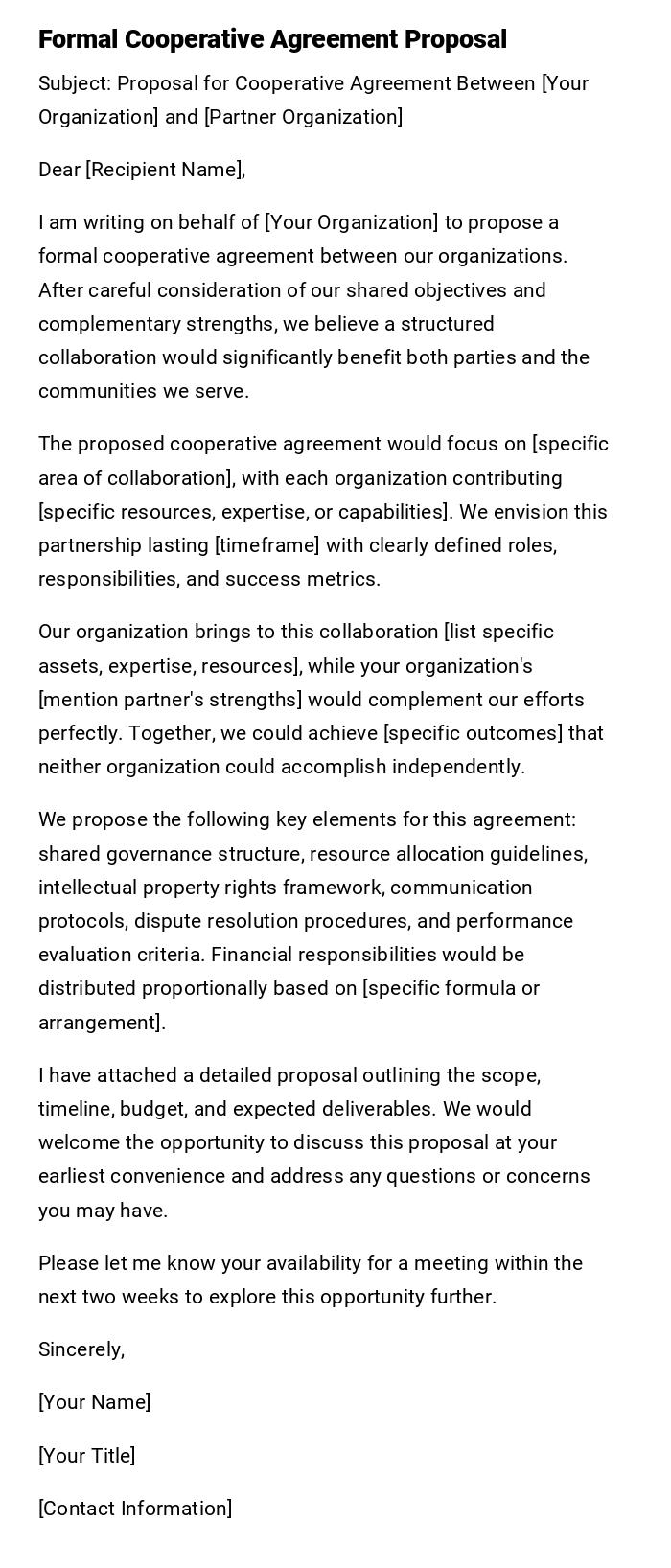
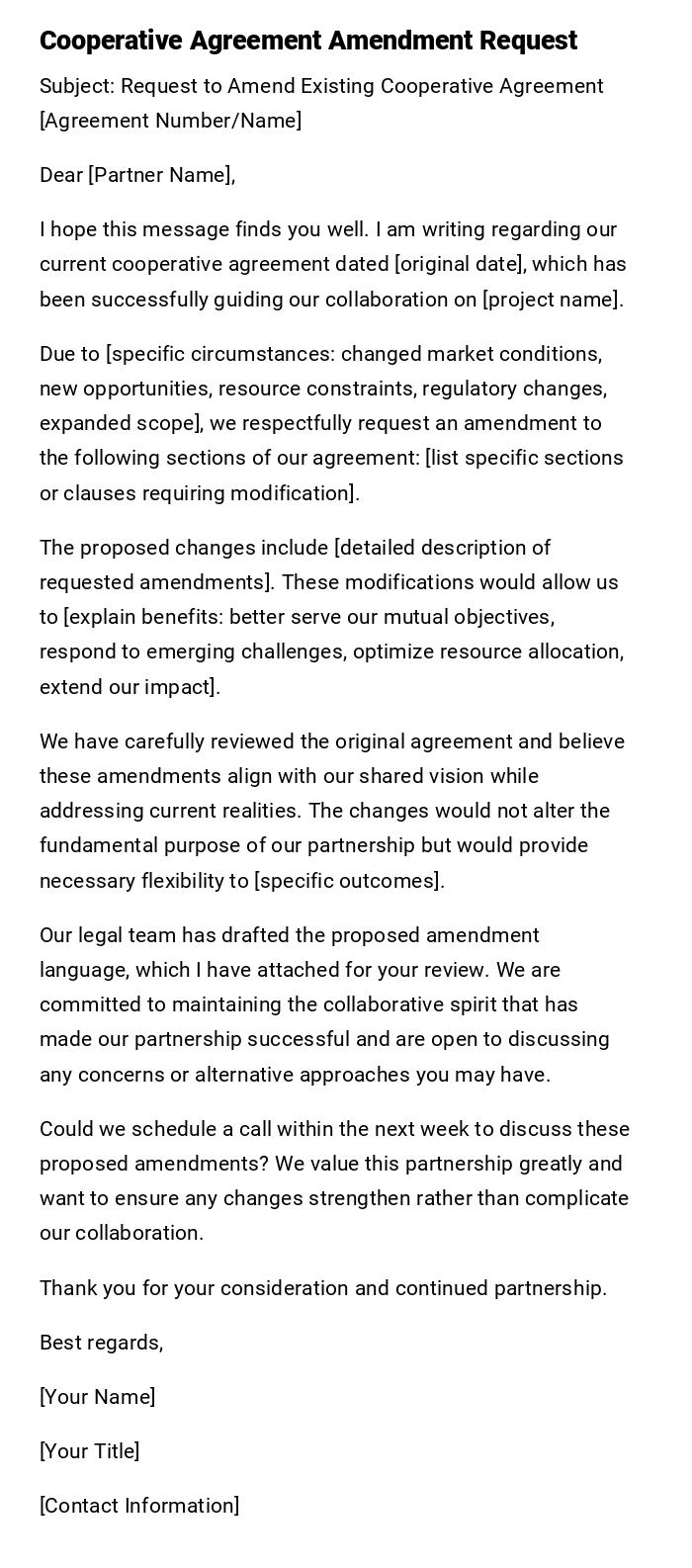
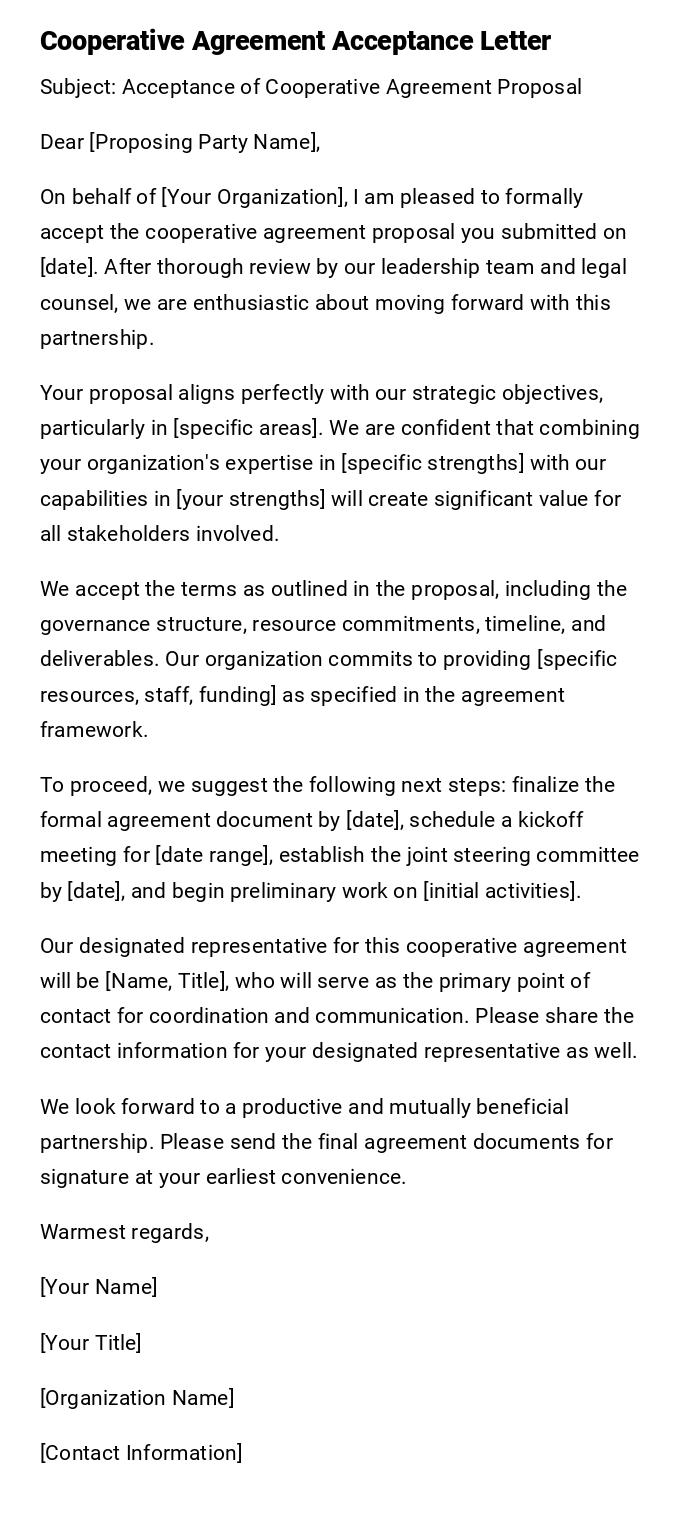
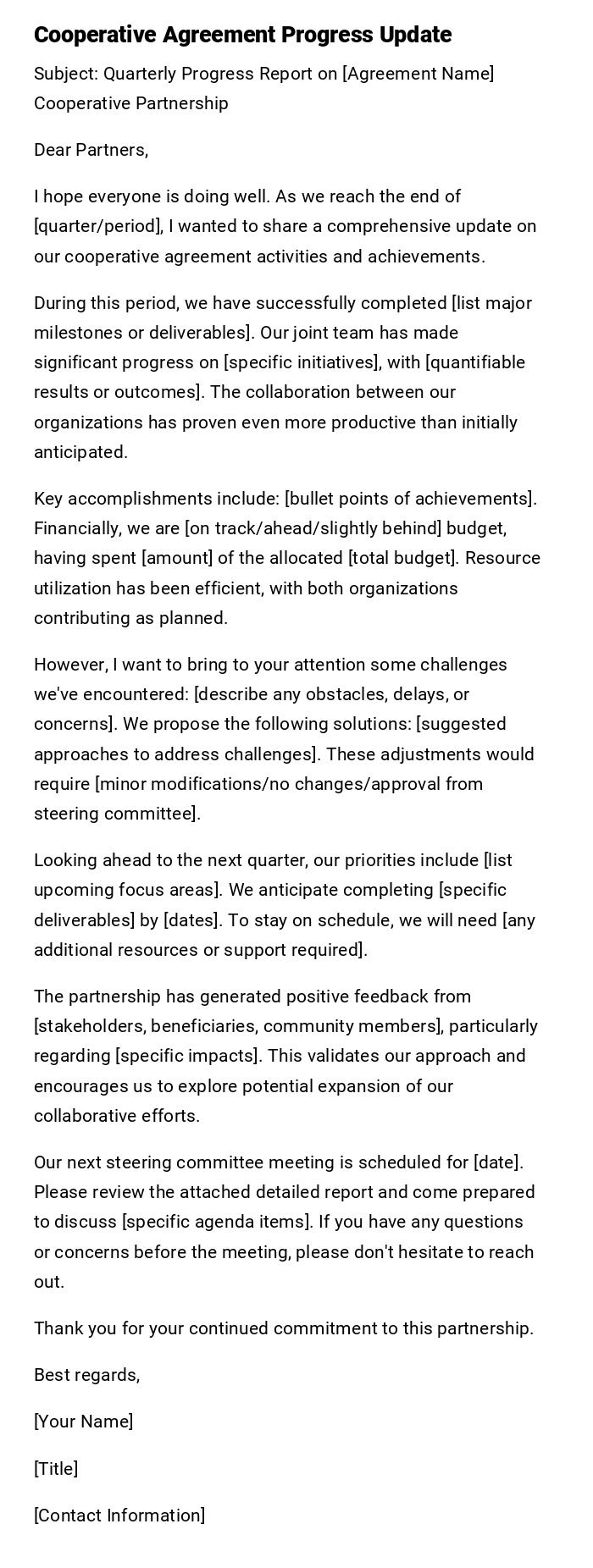
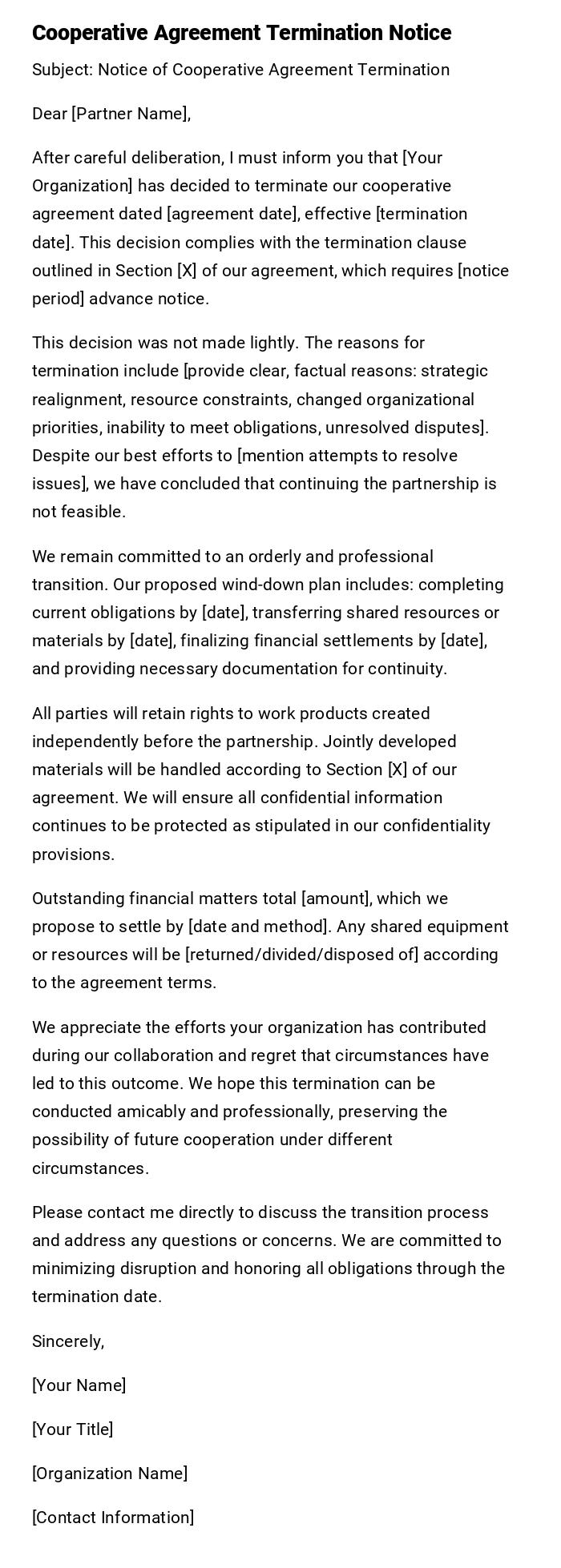
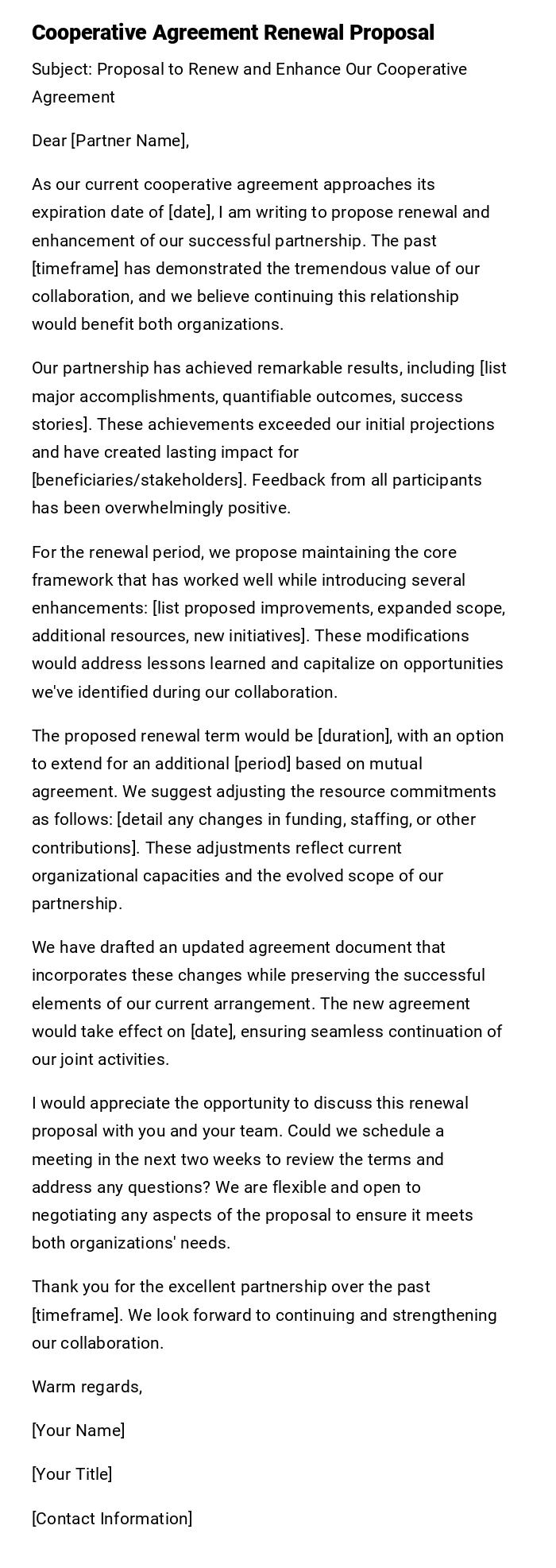
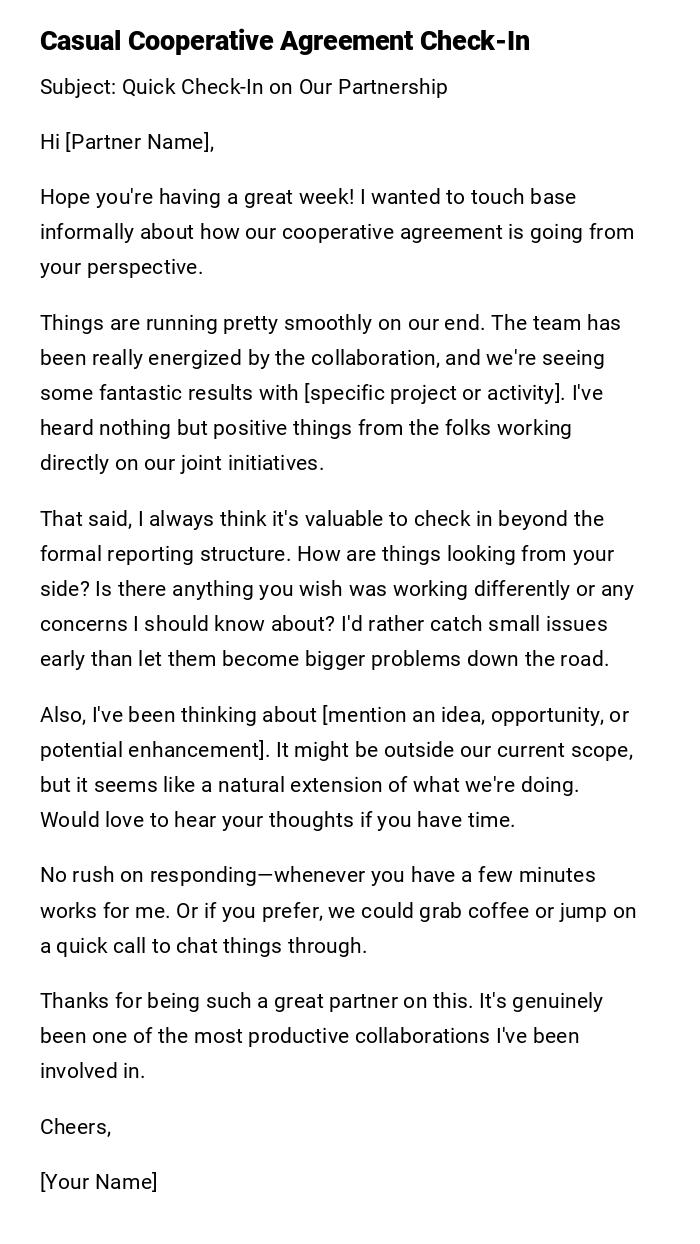
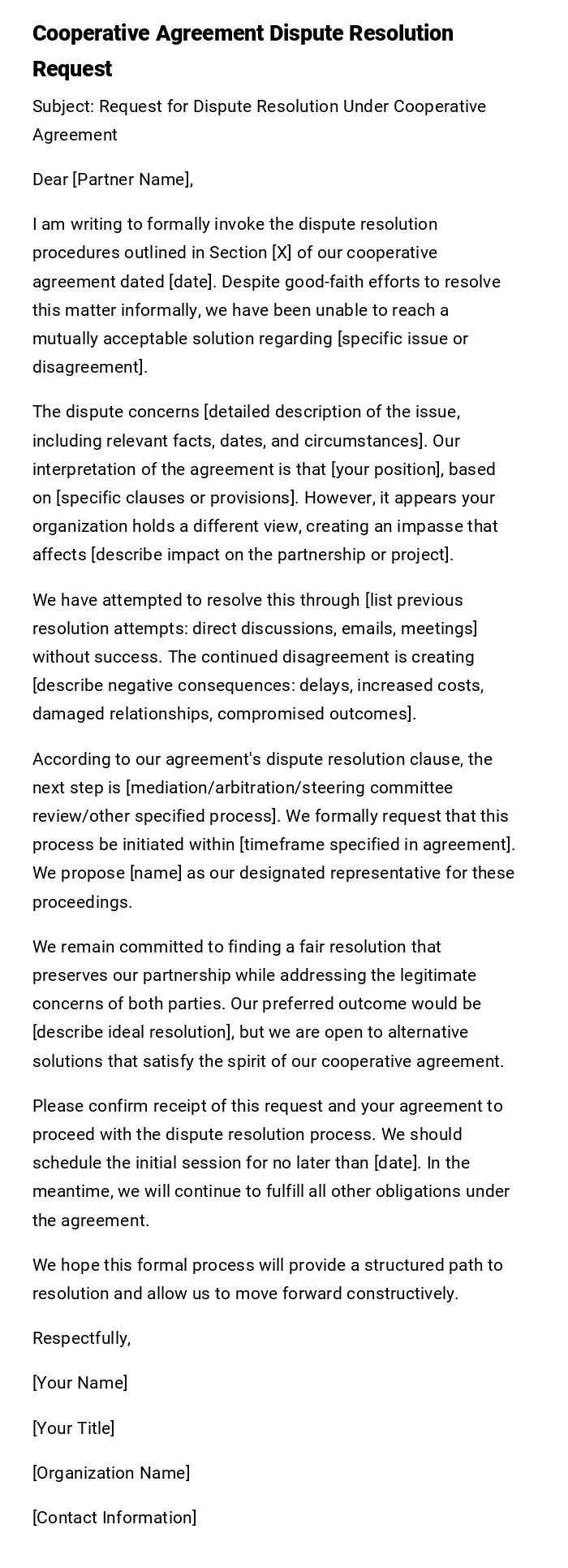

 Download Word Doc
Download Word Doc
 Download PDF
Download PDF